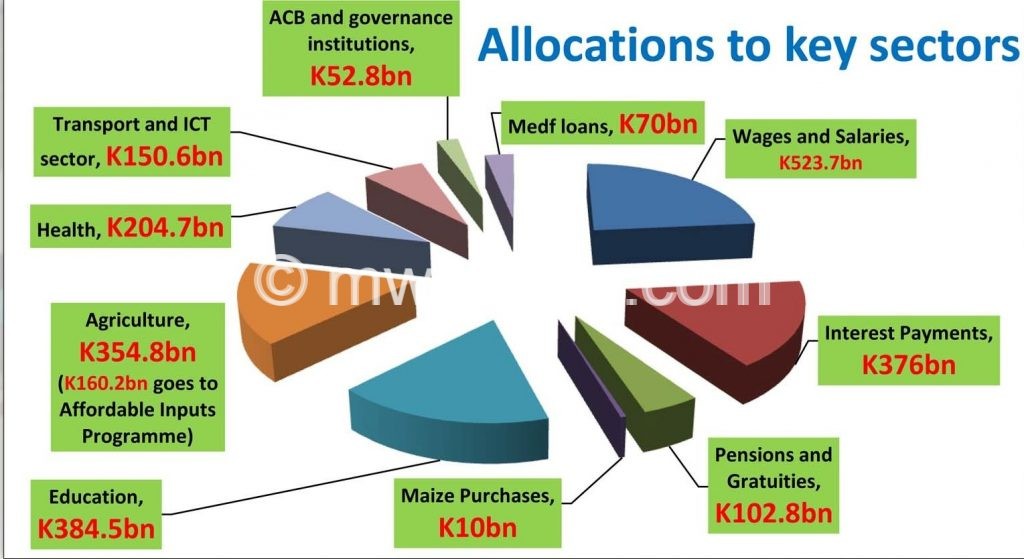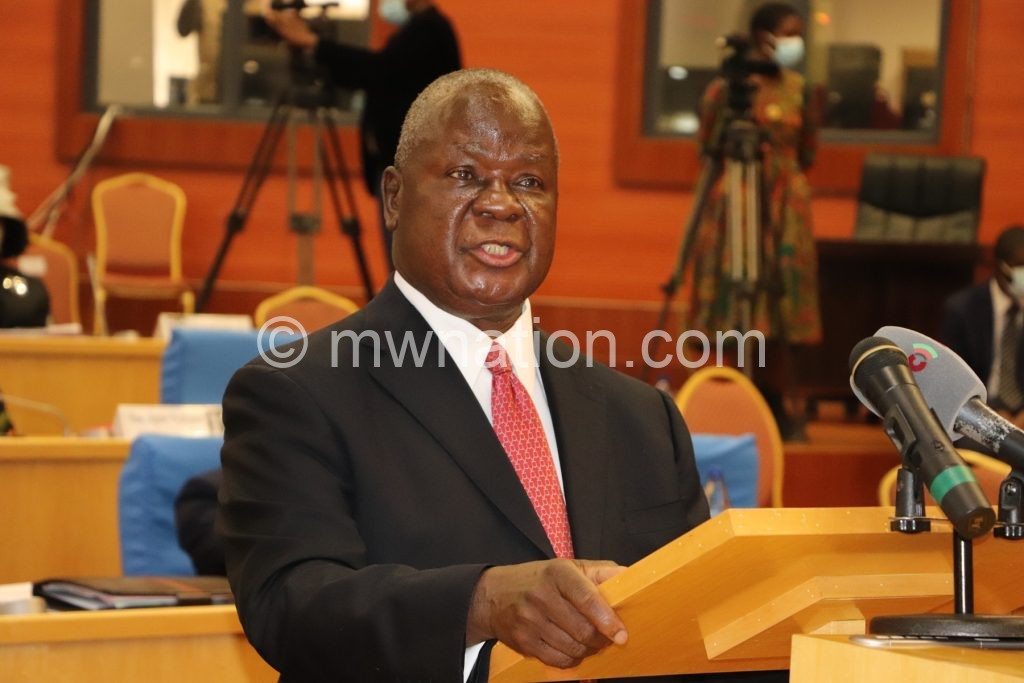Mlusu unveils first Tonse Alliance K2.2tn budget
At exactly 9.35 am yesterday Finance Minister Felix Mlusu wore a brave face to present a K2.2 trillion maiden substantive budget for the Tonse Alliance administration, which to an extent appears highly ambitious as it brings with it a ‘wish-list’ that does not seem to augur well with the country’s public purse.
Although generally hailed as pro-poor, the budget—with domestic revenue projected at K1.2 trillion or 20.1 percent of gross domestic product (GDP)—appears to defy the harsh reality that domestic revenue keeps shrinking in recent months in view of the Covid-19 pandemic, yet expenditure needs keep spiralling.

That alone has automatically led to a yawning fiscal deficit of K754.8 billion, the highest deficit ever in the history of Malawi in nominal terms.
Such a deficit is expected to be financed by foreign borrowing amounting to K224.8 billion and K530.1 billion from domestic borrowing which economic analysts we spoke to yesterday feared will worsen the crowding out effect of the private sector, while also pushing up interest rates on the market.
The projected K1.179 trillion domestic revenue is likely to be unattainable.
Huge deficit
The economic fundamentals do not give confidence that such an amount can be realised. The danger is that procurement entities (ministries, departments and agencies) base their procurement plans on approved budget and when they are funded less than expected, government accumulates arrears.
“In addition, a huge deficit with a substantial part for domestic financing risks destabilising macroeconomic framework,” feared Milward Tobias yesterday, who is also executive director for the Centre for Research and Consultancy.
At K530.1 billion, domestic borrowing alone represents 7.4 percent of GDP.

To the contrary, National Planning Commission (NPC) director-general Thomas Munthali yesterday argued that domestic debt cannot be avoided since the international players are equally affected and are focusing internally to recover their own economies first.
He said: “Basically, the increase in domestic debt is inevitable but it is good to know that it’s supported by the newly-created debt retirement fund as well as the long-term development bond.”
Though pro-poor to some extent, the budget, titled ‘Living the promise,’ to a large extent also lacks key features of a development and transformative budget, with development expenditure at K511.2 billion representing 23 percent of the total budget chunk, hence failing to pass the development budget test as it falls below a 25 percent threshold.
Of the K511.2 billion development budget, K410.3 billion is for foreign financed projects while K100.9 billion is for domestically financed projects, said Mlusu.
But most economic experts we spoke to yesterday christened the 2020/21 budget as a consumptive financial plan with wages and salaries alone allocated K523.7 billion which is 7.3 percent of GDP—and hovers above the development budget.
Such an allocation of wages and salaries represents a 13.5 percent increase from last year’s preliminary outcome and is on account of K42.7 billion for general salary increment, K14.3 billion for employer contribution to the Contributory Pension Scheme, K8.1 billion for annual wage creep, and K8.0 billion for recruitment of health personnel.
As if that is not enough, interest payments have also eaten into a huge chunk of the budget at K376 billion, which is 5.3 percent of GDP, representing an increase of 43.8 percent from the 2019/2020 preliminary outturn.
Foreign interest payments have been projected at K11.9 billion while domestic interest payments have been projected at K364.2 billion.
Subsidy and Tonse promises
Likewise, the much-touted Affordable Input Programme (AIP) to benefit 4.2 million farming families, has been allocated K160.2 billion, of which K132.7 billion is for fertiliser payments, K25.7 billion for maize seed and K1.8 billion for logistics, and the programme. They will buy fertiliser at K4 495 per 50 kg bag.
However, the arrangement has not gone down well with the Democratic Progressive Party (DPP) whose spokesperson on issues of finance Joseph Mwanamvekha accused the Tonse Alliance regime of duping Malawians, arguing it’s a complete departure from the earlier promised universal subsidy programme that they preached during campaign period ahead of the fresh presidential elections.
Said Mwanamvekha: “Malawians have been cheated and not all that glitters is gold. They promised to take Malawians to Canaan but from the look of things, we are going back to Egypt. Most of what was promised has not been provided for in the budget.”
But reacting to Mwanamvekha’s assertion, Mlusu said AIP is not far from being a universal subsidy programme, assuming an average family size of four people, it means approximately 16.8 million people will be covered under this programme out of the 17.6 million people in Malawi.
“In this regard, there is no sampling of farm families to benefit from this programme as every smallholder farmer is covered,” he said.
Though silent on tax incentives for private sector players amid Covid-19, the budget finally seals the earlier proposed increase in the tax free band from K45 000 to K100 000, automatically freeing some disposable income to low income earners.
But that adjustment has an opportunity cost with it as Treasury has forgone about K45 billion in revenue, according to Secretary to the Treasury Chancy Simwaka, who spoke during a press briefing soon after Mlusu had finished presenting the budget.
While maintaining the minimum wage at K35 000—a sharp contrast to a proposed increment to K50 000 in the interim K722.4 billion budget—the proposed budget has introduced a 20 percent withholding tax on gambling/lottery while also introducing a 16.5 percent value added tax (VAT) on refined cooking oil.
Private Sector views
From the private sector point of view, while commending government for committing itself towards completing the review of the Public Finance Management Act of 2003 during the 2020/2021 fiscal year, Malawi Confederation of Chambers of Commerce and Industry (MCCCI) director of business environment and policy advocacy Madalitso Kazembe said the private sector was anxiously waiting to see how the budget would incentivise private sector players in the wake of Covid-19.
While dubbing the budget a restorative financial plan, he also welcomed government’s decision to create a Debt Retirement Fund whose proceeds will be ring-fenced and entirely used to retire public debt until debt levels subside to within sustainable levels.
Describing the budget as ambitious, Economics Association of Malawi (Ecama) president Lauryn Nyasulu expressed concern over the optimism by government on tax revenue, recalling that in the last budget government had projected to collect K1.7 trillion yet the outturn was K1.5 trillion.
According to Nyasulu, the K1.1 trillion projected revenue in the budget is “not attainable,” adding that debt levels have recently sky-rocketed to K4.1 trillion which she said will continue to pile a lot of fiscal pressure while also pushing up interest rates.
In the budget statement, Mlusu also swallowed his pride and admitted that revenue collection has plunged by 11 percent in recent times due to the impact of Covid-19 pandemic.
Betchani Tchereni, associate professor of economics at constituent college of the University of Malawi, the Polytechnic said this has been a professionalism budget largely free of political inferences.
“First we are a little concerned that we may fail to get out of debt unsustainable levels and we are going to borrow more which is concerning,” he said.
The budget assumes a real GDP growth rate of 1.9 percent in 2020 and 4.5 percent in 2021, an average inflation rate of 9.9 percent, and a policy rate of 13.5 percent during the fiscal year.





